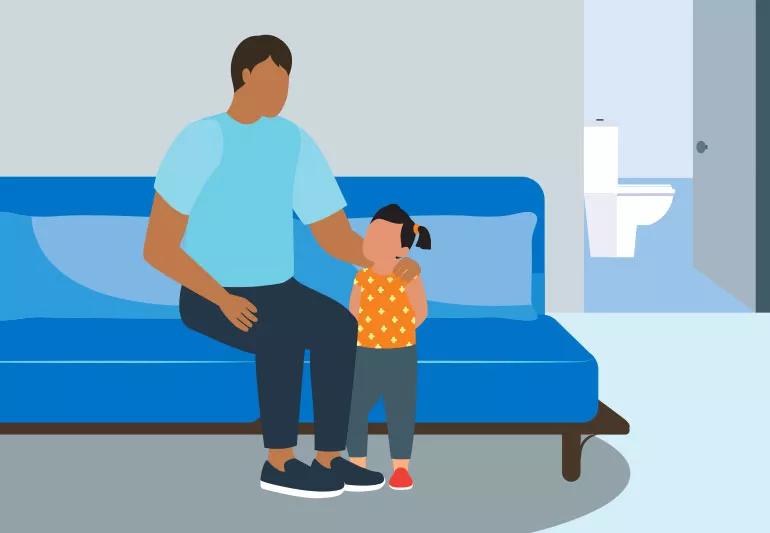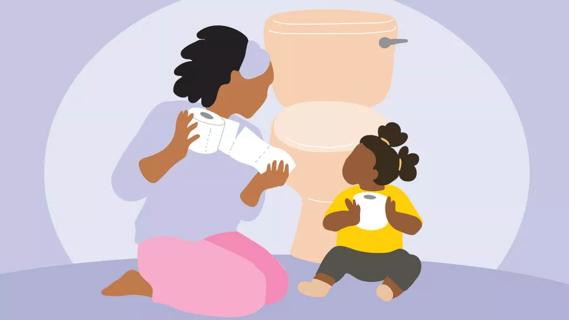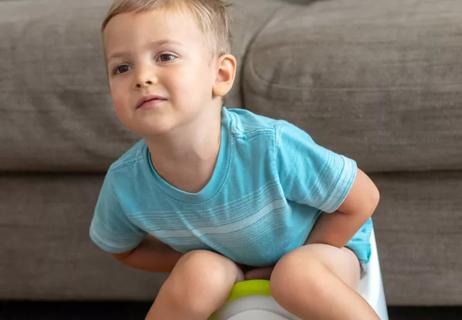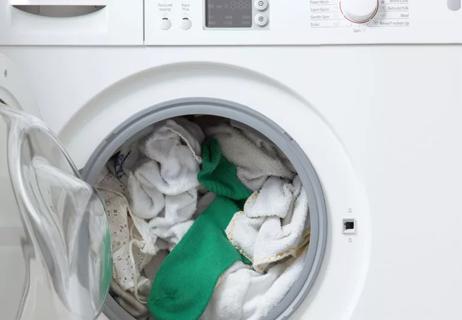Get to the source, offer encouragement and keep your cool

So, you thought your child was potty trained. And now the laundry is piling up, as they need a change of pants on the regular. And you’re wondering — why all the accidents all of a sudden?
Advertisement
Cleveland Clinic is a non-profit academic medical center. Advertising on our site helps support our mission. We do not endorse non-Cleveland Clinic products or services. Policy
While potty training regressions are, unfortunately, rather common, they can be frustrating for kids and parents alike.
“As a parent, a potty training regression can be really challenging,” says pediatrician Noah Schwartz, MD. “It’s really common for kids to have accidents and regressions, though. And how their parents handle them can make the difference in how long they continue.”
We talked with Dr. Schwartz about why kids regress and what you can do to help get them back on track.
Having an occasional, short-lived streak of accidents (for example, your child wetting themselves a few times one week, but not the next) isn’t the same as a potty training regression. If your child doesn’t make it to the bathroom because they’re too busy playing on the swings to run inside in time, that’s really not regression either. A random potty-fail like that can be expected. Accidents are going to happen.
So, if your child has been potty trained for some time and doesn’t make it to the bathroom in time once or twice, it’s not a reason to start ringing alarm bells, Dr. Schwartz says.
“Try to be patient. Wait a couple of days, and see if they’re having accidents consistently,” he recommends. “If they’re having accidents multiple times a day, or it’s only happening at school, or there’s a clear pattern developing showing that accidents are becoming more consistent, that may be when we’re talking about a regression.”
Advertisement
A regression, in other words, is a pattern of puddling, rather than a one-off incident. And potty training isn’t the only skill that your child may backtrack on.
“We consider it a regression anytime we see children who have reached any developmental milestone and then suddenly not hit that developmental goal anymore,” Dr. Schwartz explains. “We see it in a lot of areas of child development, not just potty training, but conversational skills, large motor skills and more. Kids are trying to learn and do a lot of things at once, and sometimes, they slide back for a bit.”
Your child is a unique — and sometimes, baffling — little person. So, their reasons for “forgetting” how to use the potty consistently could stem from just about anything. (If you’ve ever tried to think through the reasons you do some of the quirky things you do, you’d find you probably have some less-than-rational habits, too — it’s just part of being human.)
Dr. Schwartz says most of the time, potty training regressions stem from four main causes:
Stress is the most common reason for potty training regression. And the things that can be stressful or anxiety-invoking to kids may not be obvious to grownups.
Kids can feel high amounts of stress and anxiety when things change in their worlds. That can include:
Learning to cope with a new reality can take your child’s attention and energy away from staying dry, as they have new fears or expectations to contend with. That’s a prime time for a potty training regression.
“Anything that’s new or perceived to be new, or different or stressful for a child can invoke a regression,” Dr. Schwartz states. “When they’re dealing with other things, it’s easy to lose track.”
Consider when you’re stressed. Sometimes, the things you know you have to do — like laundry or vacuuming — just might not happen when you’re dealing with other things. The same can be true of children. Sitting on the potty can be a lot of work for a kid who has other things on their mind.
It can happen to older, school-age kids, too. Stressors can include changing schools or perhaps being bullied. In that case, it’s not that your kid has lost the skill to be potty trained. They’ve just become mentally and emotionally overwhelmed. That can mean they’ll be more likely to unintentionally ignore their body’s signals to go to the bathroom.
Children who’ve been through (or are currently experiencing) trauma may be more prone to bedwetting and potty training regressions.
Advertisement
Research shows that frequent bedwetting is associated with high levels of stress in children.
Childhood trauma can have far-reaching and long-lasting effects on your child’s physical and mental health. If you suspect your child’s potty training regression is connected to physical, psychological or sexual trauma, contact a healthcare provider right away.
It’s possible that your child is having a hard time holding in their No. 1s and No. 2s if they’re dealing with some physical health conditions. The most common culprits are urinary tract infections (UTIs) and constipation.
If your child has a UTI, they may also experience symptoms like:
If you suspect a UTI, talk with your pediatrician. UTIs are treated with antibiotics. (Contrary to some popular opinions, cranberry juice probably isn’t the answer.)
A child who is backed up may also have a hard time making it to the bathroom on time. A constipated toddler will typically poop fewer than twice per week. Hardened stool can cause a blockage. Softer, more liquid stool can leak around it, causing an accident. Also, because your colon sits just behind your bladder, a buildup of stool can put pressure on your bladder. That means your child may have to pee more often and urgently, which can increase the chances of accidents.
Advertisement
Some parents will gleefully share that their 2-year-old potty trained in a matter of days. Cue the celebration!
But sometimes, kids who appear to be potty trained for some amount of time just aren’t developmentally ready to keep it up for the long haul.
“Some kids will seem to regress, but it’s just that it wasn’t really the right time for them to be fully potty trained,” Dr. Schwartz notes.
Dr. Schwartz offers these tips to get to the root cause of the issue and get your child back on track.
Start by taking a deep breath and analyzing what’s going on. Try to discern whether you think this is truly a regression or just an unfortunate series of accidents. Consider how long the accidents have been happening, note any patterns you’ve seen and determine if there are any obvious changes or stressors that may have been the trigger. If you notice any symptoms that make you suspect they’re having belly troubles, talk with your child’s healthcare provider.
If you believe it’s a stress- or anxiety-related regression, talk with your child on their level and see if you can understand what the cause may be. Keep your tone nonjudgmental and positive. If your child fears you’re mad at them for having accidents, it can make matters worse.
Advertisement
If there’s something stressful in their life that you can help them cope with, try to find avenues to lower their anxiety. If they’re afraid of using the potty at school, for example, ask their teacher if you can join them for a look at the bathroom. Point out how it’s similar to other potties they use and remind them that they’re safe.
Dr. Schwartz says to lead with encouragement and understanding.
“You can say things like, ‘I know that something has changed, and you’re feeling uncomfortable, but we’re here for you.’ Keep the pressure to a minimum, but make the potty accessible, and give plenty of gentle reminders.”
But some stressors won’t go away so easily.
“Unfortunately, if it’s a trauma or complicated family events, there’s only so much you can do to make that issue go away,” Dr. Schwartz recognizes. “It’s a matter of teaching your child how to adapt. Sometimes, it can take a little bit of time, and getting professional help is a good place to start if something major is happening.”
If you’ve ruled out a medical issue, it may be time to go back to your old friend the sticker chart or whatever method worked for you when potty training your child the first go-round.
“If you were successful with certain measures, it usually helps to bring those things back,” Dr. Schwartz says. “Give them reminders of when to sit on the toilet, and work on a sticker chart or a reward system for using the potty. Whatever worked in the past can help get them back on track.” Try to make using the potty exciting again. Turn it back into something they look forward to doing.
If you think the regression could be because your child simply wasn’t ready to use the potty all day every day, you might also consider going back to training pants while continuing to work on potty training.
Your child can tell when you’re having strong feelings and will pick up on your cues. So, keeping level-headed (even when you’re frustrated) will help turn a regression around.
“The more anxiety that the parent has, the more that is going to transfer to the child, which certainly won’t help the situation,” Dr. Schwartz warns.
Your child’s pediatrician or another medical professional who specializes in children can help. Getting treatment is particularly important if you worry that your child’s potty training regression is due to a medical condition or trauma.
Potty training regressions can be baffling, but with some detective work and tons of encouragement, the accidents should let up soon. Hang in there. You’re doing great!
Learn more about our editorial process.
Advertisement

There’s more than one way to potty train, but this intensive method can kickstart the process

Set your child up for potty training success by waiting until they’re ready, keeping the pressure low and going heavy on the praise

Praise and nonfood prizes go a long way

When your toddler won’t poop, here’s what you can do

How to help (and not shame) your child — while keeping your sanity

Combat summer learning loss and keep young brains engaged with low-pressure learning

Adding extra formula, cereal or medications to your baby’s bottle is a dangerous and misguided practice

Teaching your baby to sign may help ease frustrations before they can talk, but it’s not a must-do

The best parenting style balances enforcing rules and showing plenty of love

Tips include cutting back on sugar, focusing on exercise and managing stress

It can be harder to let go when you’ve invested time, energy and emotions — but it might be the healthier choice long term